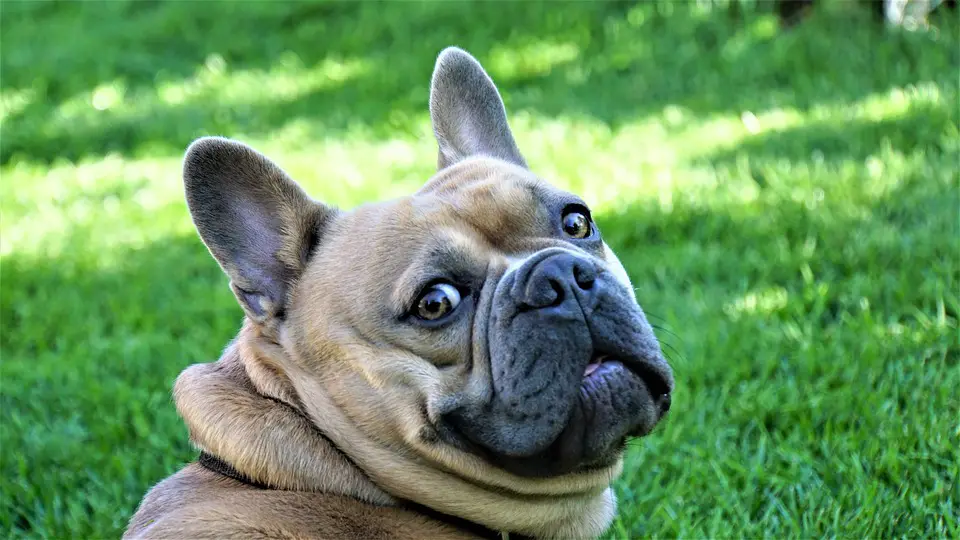Kennel cough in French bulldogs results in your dog being in contact with other dogs or being in areas where infected dogs have been. Bordetella is a medical name for kennel cough. It occurs in dogs that have recently been boarded in kennels. But keep in mind that your dog can also contract kennel cough in areas they encounter other dogs. These include daycare for dogs, grooming salons, vet offices, training classes, dog parks, and other events or spaces where there are dogs.
Kennel cough is similar to a cold in humans. It can be bacterial or viral. Every time your dog is near an infected dog, there is a potential for infection. The incubation of this disease is about 3 to 10 days meaning your dog will not exhibit symptoms of illness for 3 to 10 days after exposure to the virus. Because of this, it is challenging to detect if a dog is infected before potentially spreading the virus to others in his environment. It also explains why a dog may leave a clinic or facility with no symptoms, only to exhibit symptoms later on. Kennel cough in French bulldogs similar to other dogs can also happen after exposure to the virus.
What Causes Kennel Cough in French Bulldogs?
Kennel cough can result from bacteria and viruses. In some cases, it is a combination of both. French Bulldogs become infected when they inhale these bacteria and various pathogens into their respiratory system.
A typical cause of the bacteria is the Bordetella bronchiseptica strain or simply Bordetella. Dogs are likelier to be infected by Bordetella when their immune system is compromised. It usually happens when they get infected by a virus.
Transmission of Kennel Cough in French Bulldogs

A majority of bulldog Kennel cough infection is transmitted via one infected dog to another. These viruses go airborne and can land on articles such as beds, grooming items, as well as human hands. The exception is the distemper virus, which is passed through the fecal-oral route. Regardless of the transmission, crowded areas make dogs more vulnerable to exposure and transmission.
- Kennels
- Shelters for animals
- Vet Hospitals
- Doggy Day Care centers
- Puppy training classes
How Does Kennel Cough Manifest in French Bulldogs?
If your French Bulldog is suffering a kennel cough, the main symptom is consistent and forceful coughing. Besides coughing, your dog shouldn’t feel seriously ill and should still enjoy a good appetite.
However, some dogs exhibit symptoms such as sneezing, runny nose, as well as eye discharge.
The sound of kennel cough
The coughing can seem like something is stuck in the throat of your dog. The sound is hoarse, dry cough. The coughing can produce mucus. Keep in mind the coughing is not similar to a sneeze or reverse sneeze.
How do dogs get infected with kennel cough?
A majority of dogs get infected from kennel cough via dog kennels and shelters. It is where the illness got its name. Dogs became infected due to being in close contact with other infected dogs.
Several factors increase the likelihood that a dog will become infected by kennel cough:
- Close contact with other dogs with kennel cough
- Crowded conditions
- Subpar ventilation
- Cold temperature
- Exposure to tiny particles such as dust and cigarette smoke
- Stressful travel
Ways Kennel Cough Spreads
Kennel cough is extremely contagious and can spread easily from one dog to another. Once a dog coughs, the bacteria and viruses are emitted and become airborne. It speedily spreads to other animals. It can land on dog toys, food bowls, as well as shared objects.
If you suspect your dog is suffering from this illness, make sure to keep them away from other animals to mitigate the spread.
What Is the Incubation Period of Kennel Cough?
Incubation is between 2 and 40 days. At this time, the dog is extremely contagious. Some dogs can be carriers of this illness for months without showing any symptoms.
Duration of kennel cough
Typically kennel cough clears up within 3 weeks. In some cases, it can take up to 6 weeks to fully heal, especially for senior dogs or those suffering from other medical conditions.
But in extremely rare cases, the illness can progress to pneumonia, so it is crucial to consult with your vet if your dog doesn’t improve.
What Is the Best Treatment for Kennel Cough in French Bulldogs?

Kennel cough is nothing to worry about and usually goes away on its own. In a majority of cases, it clears up within 3 weeks, even without treatment. If your dog seems energetic with a good appetite, you should be able to utilize home remedies to ease your dog’s symptoms. It includes keeping them in a humid area and freeing them from a collar.
If you think that the symptoms are worrisome, make sure to consult a vet. You must phone your vet beforehand and explain why you think your dog has kennel cough so that they can mitigate the risk to other dogs in the clinic.
Your vet may be able to recommend antibiotics for kennel cough to eradicate the Bordetella bacteria. If needed, your vet may also prescribe a cough medicine for dogs or an anti-inflammatory to ease your dog’s throat.
Is There a Vaccine for Kennel Cough?
Protection against viruses that trigger kennel cough is already included in puppy and booster vaccinations.
Your vet may also recommend vaccinating your dog against the cause of kennel cough, Bordetella. It can be administered via nasal spray or injection. A majority of kennels require that a dog has this vaccination before they are admitted.
Kennel cough can result from numerous causes and strains, vaccination is not a guarantee that your dog is protected.
Can Kennel Cough Be Transmitted to Humans?
Kennel cough is a respiratory infection. It is not a specific disease, and because of this, it has a range of possible causes. A majority of canine viruses are not transmissible to humans.
The main bacteria, Bordetella bronchiseptica, is infectious to humans. It is only a risk for people with compromised immune systems. There is insufficient evidence that humans can contract the bacteria from animals. Cases of this type are extremely rare and shouldn’t be a concern for a majority of people.
Prevention of Kennel Cough in French Bulldogs

It is crucial to vaccinate your French bulldog with the Bordetella vaccine to mitigate the risk. However, your dog can still get infected with kennel cough even if he or she has gotten the vaccination. There are several strains and mutations of the Bordetella virus. Bordetella vaccine is comparable to flu shots for people. Every year, a vaccine is developed to overcome the strains which are suspected to be widely prevalent. To put it simply, a Bordetella vaccination is not a guarantee your dog will be protected from kennel cough.
Instead, it is crucial to develop the immune system of your dog. It is the best defense against infection. Because of this, puppies, senior dogs, and dogs with compromised immune systems are more vulnerable to getting infected with kennel cough.
What Are Precautions Kennels Utilize to Reduce the Risk of Dogs Getting Infected With Kennel Cough?
In some cases, kennels will require that every dog they admit must be current with their vaccines, including the Bordetella vaccine. Kennels also follow strict cleaning methods, including daily cleaning of every surface with a disinfectant that is dog friendly. There are also scrub downs and routine deep cleanings.
Although the staff of kennels and doggie daycare centers may not be trained to diagnose kennel cough, they can identify the symptoms. Staff are cautious and apply preventatives. If dogs are observed to exhibit kennel cough symptoms, they are immediately quarantined to mitigate other dogs’ further exposure. The owner and a vet are notified at once. Other conditions can trigger coughing, such as allergies, and swallowing a bone or toy. A vet must rule out all these.
Vet Treatments of Kennel Cough in French Bulldogs
Unfortunately, similar to the human cold, there is no speedy cure for kennel cough. In the majority of cases, kennel cough must run its course and go away on its own without vet intervention. It typically clears within a few weeks. But if symptoms are severe, or your dog is suffering from a compromised immune system, a vet will often recommend antibiotics to help mitigate the symptoms and stop any secondary infections that might occur. Since there is no optimum way to diagnose kennel cough, vets examine the dog’s symptoms to come up with a diagnosis. They eliminate any other possible causes. You can also help mitigate the risk of your dog contracting the virus by giving them a Bordetella vaccine annually.
Home Remedies for Kennel Cough
Although there is no specific cure for kennel cough, there are several ways you can do it at home to mitigate the symptoms and help your dog recover immediately.
Plenty of bed rest
Again, similar to the human cold, the more you get bed rest, the sooner you can regain your health. Since physical exercise can exacerbate your dog’s symptoms, it is crucial to minimize their activity and get optimal rest and sleep, helping them get back on their feet quicker.
Raw honey
Honey can serve as a natural antibacterial agent. Add raw honey to your dog’s daily nutrition. Infuse it in their water or allow them to lick it off from a spoon. It helps soothe their throat and suppress their coughing.
Coconut oil
Coconut oil serves as a strong antiviral and antibacterial as well as an antimicrobial agent. Because of this, giving your dog plenty of coconut oil every day helps fight off kennel cough bacteria. But you must be cautious since too much coconut oil has a laxative effect. Administering one teaspoon per 10 pounds of dog weight is the optimal amount.
Steam
You might also want to bathe your dog in the shower. The steam emitted by the shower will help to ease your dog’s nasal passages and respiratory system. It allows them to breathe easier and loosen phlegm.
Facts About Bordetella Vaccine
Reputable boarding facilities require that your furry canine guest must be injected with the Bordetella vaccine. A majority of pet owners and vets give the vaccine every year. Although the vaccine does mitigate the risk of contracting kennel cough, similar to the human flu shots, the vaccine does not mitigate every strain of the virus. Getting a Bordetella vaccination is not a guarantee that your dog won’t ever catch kennel cough.
Prognosis of Kennel Cough in French Bulldogs
Typically kennel cough gets cleared within days. A dog will only require basic nursing care after suffering symptoms. Home care includes rest, a stress-free environment, good nutrition, as well as supplements.
Duration
Duration of the clinical signs of kennel cough is typically short, spanning only days.
Time and location
Different pathogens vary in importance and intensity based on the location and the season.
Antibiotics
Antibiotics will only fight the bacteria part of the infection. The virus parts do not respond to antibiotic treatment.
Coronavirus
It is crucial to note that canine respiratory coronaviruses are not the same as the human Covid 19 coronavirus. The canine version is not transmissible to humans.
Shading
A majority of kennel cough carriers might be asymptomatic. They might silently shade and infect other dogs. Fortunately, a majority of Bulldog kennel cough bacteria and viruses only live short. However, it is crucial to disinfect critical kennel facilities properly.
Immunity
The following dogs are more vulnerable to a severe type of kennel cough:
- Puppies
- Stressed and anxious dogs
- Immunocompromised dogs
- Dogs who are taking immunosuppressants
Examining Kennel Cough in French Bulldogs
Bulldogs suffering from kennel cough complications must consult with a vet as soon as possible.
Final Thoughts
If you travel away from home for several days, you might need to board your dog in a kennel. Your French bulldog, similar to other breeds, is vulnerable to kennel cough. To mitigate this risk, it is crucial to get a Bordetella vaccination for your French bulldog and choose a reputable kennel. The kennel must have well-maintained facilities and knowledgeable staff who apply preventative measures to mitigate kennel cough and other dogs’ health issues.

